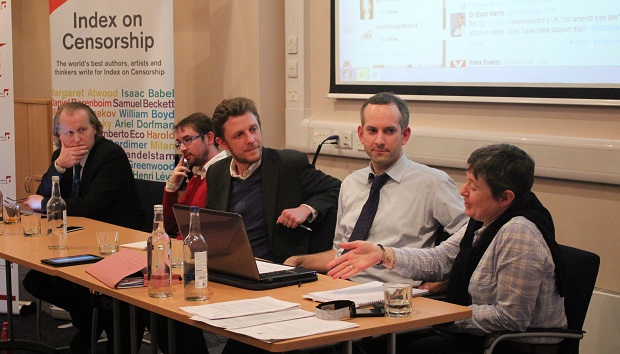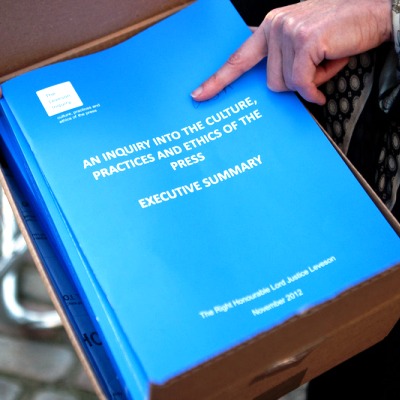20 Feb 2014 | Europe and Central Asia, News and features, United Kingdom

The panel from left to right: Gavin Millar QC, Tom Phillips, Padraig Reidy, Jonathan Heawood and Gill Phillips (Image: Georgia Hussey)
A new press regulator, with or without statutory underpinnings, would not stop another scandal like phone hacking from happening, an Index on Censorship panel said yesterday. The panel, consisting of Gill Phillips (Legal Director, Guardian Media Group), Gavin Millar QC (Doughty Street Chambers), Jonathan Heawood (Director of the Impress Project), and Tom Phillips (Senior Writer, Buzzfeed UK), chaired by Padraig Reidy, spoke at a Doughty Street Chambers and Index on Censorship debate on press freedom in the UK after the Leveson inquiry.
“In terms of the institutions that failed over phone hacking, the Press Complaints Commission doesn’t even make it onto the podium,” said Tom Phillips. “So the idea that any kind of regulation was ever intended to be the solution to this is missing a whole bigger picture.”
If you set up a system to stop something “human ingenuity and imagination” will find a way to get around it, said Gavin Millar QC. He added that the best regulation “has to come from the heart”, and was worried about the complicated rules surrounding regulation taking the responsibility away from those “who are putting the stuff out.”
Jonathan Heawood argued that we can make press abuses “less likely” though a “good, intelligent, intelligently applied regulator” and “sufficiently enforced, sufficiently clear sanctions”. He added that regulation is “part of the solution” to improve conditions allowing public interest journalism to flourish.
Press regulation took centre stage at the event, but wider issues of press freedom were also discussed. Gavin Millar pointed out how the UK’s debate on press freedom and press regulation may be perceived in authoritarian countries, while Tom Phillips warned that ignoring the evolving social norms of the internet age bad is for press freedom. Gill Phillips argued that while the UK isn’t as bad on press freedom as some other countries, “where we’re going” and “the threat of criminalisation that effects every day journalism” is worrying.
The event took place ahead of the release of Index on Censorship’s policy paper Life after Leveson: British media freedom in 2014. The paper acknowledges that the recent change in libel law was good for this country’s press freedom, “the record of successive governments have been far from perfect” and “there are still several areas where this government can act to safeguard the free press and free speech more broadly in the coming year.”
It was a timely discussion, as yesterday the High Court dismissed David Miranda’s challenge to his detention at Heathrow under the Terrorism Act in August. It was also the day former News of the World editor Rebekah Brooks took the stand in the ongoing hacking trial.
“The [Miranda] judgement has some wide ranging views downgrading journalism in the 20th century that I find personally bizarre,” said Philips. Millar said the judgement shows how the “remaining tendency of government using the possibility of court proceedings against newspapers to stifle the publication of state secrets” has a “chilling effect” on press freedom.
The sold-out event encouraged audience interaction, which made for a lively and at times heated, debate. One comment from the floor argued the panel had missed the point — that the debate was about press abuses, and a regulator was the minimum step that had to be taken. Another audience member questioned the press calling for regulation of other industries, but not wanting to be regulated themselves. The Guardian’s Roy Greenslade argued that we need to separate those issues of press abuse that can be tackled through the law and those that must be tackled by self-restraint on the part of the media. Observer columnist Peter Preston said the Royal Charter regulator would be part of a “conspiracy of chaps”.
The discussion also took place on Twitter, under the hashtag #LifeAfterLeveson
This article was published on 20 February 2014 at indexoncensorship.org
6 Feb 2014 | Events, Media Freedom, Uncategorized

Join Index on Censorship for a lively discussion of the past and future of Britain’s free press.
2014 is set to be a pivotal year for UK media. The new defamation law will see its first tests, and the press and campaigners are rushing to establish a new regulator. Is the free press under threat? How much of a difference will new libel laws matter? Is the debate already out of date?
With Gill Phillips (Legal Director, Guardian Media Group), Gavin Millar QC (Doughty Street Chambers), Jonathan Heawood (Director of the Impress Project), Tom Phillips (Senior Writer, Buzzfeed UK), Padraig Reidy (Index on Censorship, Chair).
WHEN: Wednesday 19th February 2014, 18:30 – 20:00 inc. drinks
WHERE: Doughty St Chambers, 53-54 Doughty St, WC1N 2LS
TICKETS: RSVP here
@IndexEvents – #lifeafterleveson
Generously supported by

30 Dec 2013 | News and features

2013 in the UK was the year social media became a “how” rather than a “why” issue. We’re no longer explaining what people do on the web, now we’re discussing how we behave. And we talked most about the abuse and threats received by many women on Twitter. When writer Caitlin Moran proposed a one-day Twitter boycott in August, Index’s Padraig Reidy responded. Read here

Communal censorship reared its ugly head in the UK when Madras Cafe, a Bollywood action film, was withdrawn from cinemas after protesters claimed it was anti-Tamil. Salil Tripathi likened the incident to the rows over Gurpreet Khaur Bhatti’s Bezhti and Salman Rushdie’s Satanic Verses

When Guardian columnist Suzanne Moore found herself at the centre of a storm after an article in which she described the idealised body shape of a “Brazilian transexual”, the Observer took the entirely sensible decision to commission Moore’s old friend Julie Burchill to defend her. The effect was described neatly by tweeter Stuart Houghton: “Julie Burchill has poured oil to calm troubled waters. Then drowned some seabirds in the oil. Then set fire to the oil.”
Index on Censorship refrained from getting involved. Until a government minister did…

Oh, Internet (there was a free speech point to this, honest)

As protesters filled Istanbul’s Gezi Park this summer, Ece Temelkuran explained the Turkish government’s fear of the social media generation.
26 Nov 2013 | Comment, Media Freedom, News and features, United Kingdom

Martin Moore of the Media Standards Trust has written a long article for the New Statesman on the “topsy-turvy” world of the debate on press regulation and restrictions.
Moore undoubtedly makes some good points about the absurdity of some newspapers protesting potential political interference in the press while not raising a even the mildest objection to the government and secret services actual threats to the Guardian over its coverage of GCHQ surveillance techniques (similar points were made with elan by the Spectator’s Nick Cohen a few weeks ago).
The MST director berates newspapers for having “got the debate the wrong way round” both “in principle and in practice”.
But Moore and his comrades who support the Royal Charter, in the Media Standards Trust, Hacked Off, and individuals, themselves must take some blame for the topsy-turviness of the language around regulation.
Take the idea of “exemplary damages”, which, it is proposed, publications that do not sign up to a recognised regulator will be subjected to.
The pro-Royal Charter argument has been that the existence of exemplary damages, and the avoidance of them are “incentives” to join the regulator. They are not. They are a punishment for not joining the regulator. An incentive would suggest putting publications at an advantage; but under the current proposals, all that joining a regulator does is to put publications on a level footing with individuals or organisations who would not be considered subject to the regulatory scheme. An “incentive” to avoid default punishment is akin to a threat from a protection racket.
Further on in his article, Moore calls for a British version of the US’s First Amendment. It’s a nice idea.
But Moore says that Lord Justice Leveson proposed a British First Amendment. This is not the case.
What Leveson recommended was this:
In passing legislation to identify the legitimate requirements to be met by an independent regulator organised by the press, and to provide for a process of recognition and review of whether those requirements are and continue to be met, the law should also place an explicit duty on the Government to uphold and protect the freedom of the press.”
At first glance, that’s all very lovely. But it is meaningless at best, dangerous at worst, and certainly not a First Amendment style law.
Meaningless because all sorts of countries have constitutional guarantees of a free press. China, for example, states in article 35 of its constitution that “Citizens of the People’s Republic of China enjoy freedom of speech, of the press, of assembly, of association, of procession and of demonstration.” Fine words.
Dangerous as it could imply that the government of the day ultimately holds press freedom in its hands. This, it may be argued, is the case anyway, but to explicitly say it is not ideal. As noted in a recent Huffington Post article by Hacked Off’s Brian Cathcart, the British government has made many attempts in the past to stifle press freedom. I don’t really see why we should explicitly say the concept belongs to them.
The first amendment states simply:
Congress shall make no law respecting an establishment of religion, or prohibiting the free exercise thereof; or abridging the freedom of speech, or of the press; or the right of the people peaceably to assemble, and to petition the Government for a redress of grievances.”
To claim that Leveson’s proposal, specifically to create a law about freedom of the press, is the same thing, is odd. When coupled with the proposal of punitive measures for those publishers who do not wish to play the government’s game, the claim is absurd.
This article was originally posted on 26 Nov 2013 at indexoncensorhip.org









